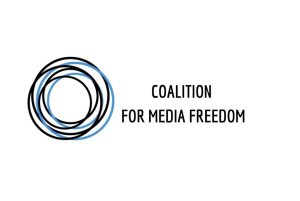To contribute to the European Commission’s Rule of Law monitoring, OBC Transeuropa, in partnership with SCiDEV and IJAS, produced two Shadow Reports outlining the challenges and gaps in media freedom in Albania and Serbia. The main findings were presented during a webinar
The Shadow Reports on media freedom in Albania and Serbia jointly prepared by OBCT and partner organisations SCiDEV and IJAS suggest that significant challenges related to media freedom persist in both countries, particularly in combating disinformation, safeguarding journalistic independence, and addressing media ownership concentration.
The key findings of the Shadow Reports were presented in a webinar held on October 7, during which experts discussed issues such as attacks on journalists, transparency of media ownership, and the criminalization of defamation.
As Cristina Caputo, Deputy Director of the Adriatic and Balkan Unit at the Italian Ministry of Foreign Affairs and International Cooperation, emphasised, “media freedom and pluralism face common challenges in both EU member states and candidate countries.” This highlights the need for transnational collaboration to enable cross-border monitoring and coordinated responses.
As one of the EU fundamental values, media freedom is a crucial element of the EU accession process. As Maja Smrkolj from the DG NEAR of the European Commission explained, freedom of expression and media freedom, which are addressed in Chapter 23 of the EU acquis communautaire on the judiciary and fundamental rights, “are key indicators for candidate countries’ readiness to become part of the EU”. This year, to support candidate countries’ reform efforts, the European Commission decided to include some enlargement countries in the 2024 Rule of Law Report, which encompasses a dedicated chapter on media freedom and pluralism. In addition, the European Commission’s enlargement package that should be published in the coming weeks “will dedicate particular attention to monitoring the state of media freedom and pluralism”.
As reported by Ms Smrkolj, the EU has been quite supportive of media sectors in candidates also in financial and technical terms “providing grants to media and media organisations and promoting innovative media initiatives through the Civil Society Facility and media programme”.
Media freedom is also central to the reform agendas developed by the two countries under the new Growth Plan for the Western Balkans, whose payments are based on a strong conditionality that “should provide additional incentives for countries to deliver on these topics”. Both Albania and Serbia included issues related to media freedom in the reform agendas: for Ms Smrkolj this is a sign that indicates their commitment to improving the situation in this area.
Key Challenges
Challenges to media freedom in both countries are mainly structural: working conditions are precarious, law implementation remains problematic, and journalists increasingly face threats, including libel lawsuits.
Media ownership concentration and the symbiotic relations between politics, media, and business remain a primary concern in the Albanian media landscape, leading to a decline in the quality of journalism and increased self-censorship. As reported by Blerjana Bino, executive director at SCiDEV, attacks on independent and professional journalists, public figures, and watchdogs CSOs have been on the rise.
Labour rights and poor working conditions remain a significant concern. As Ms. Bino pointed out, “journalists often work under formal contracts whose provisions are not implemented. The lack of economic security and economic and social welfare in the workplace definitely affects their ability to produce quality journalism”. Access to information also remains challenging, as she shed light on the “pervasive culture of secrecy within government institutions.”
In Serbia, media ownership remains opaque, with public media companies being partially state-owned, leading to political influence over editorial content: “we are struggling to see who is the real owner of media outlets” stated Tamara Filipović, secretary general of IJAS highlighting the persistent lack of transparency in the sector. Ms Filipović also highlighted that attacks on journalists have risen, and SLAPP lawsuits are increasingly common, with over 10 new cases filed since May 2024.
Despite both countries having adopted media laws in line with EU standards, implementation remains a significant problem. In Serbia, for example, the adoption of two new media laws —the Law on Public Information and the Law on Electronic Media— has so far been followed by poor and inadequate implementation, especially when it comes to the functioning of the regulatory authority (REM), which, as noted by Ms Filipović, proves that “there is no political will to change anything in the media scene”.
As recalled by Ms Smrkolj, the EU’s acquis on media freedom has expanded over the past years with the adoption of new legislative measures such as the European Media Freedom Act aimed at harmonising the media landscape across Europe, and the anti-SLAPP directive aimed at protecting journalists, activists, and anyone who engages in public participation from vexatious lawsuits. Both Albanian and Serbia will need to align with these provisions before accession. In the recommendations we advanced as part of the Shadow Report, we urged national authorities to consider these legislative developments and ensure that national laws comply with the new provisions. “On the Commission side, we are ready to prioritise these issues in our discussions with national authorities”, added Ms Smrkolj.
Intertwined pillars
As Massimo Moratti, OBCT senior researcher reminded in the conclusions, media freedom is only one of the pillars of the rule of law, and it cannot be adequately ensured without a broader approach that includes, among others, the strengthening of a free and independent judiciary: “we are talking of media freedom today, but let’s not forget the other pillars of the Rule of Law Report, namely the independence of the judiciary and the struggle against corruption. These two aspects are very close to media freedom”. A weak judiciary that does not ensure proper protection to journalists has of course a negative impact on media freedom, discouraging journalists from engaging in investigations or activities that would expose them to even more violence and threats. “Impunity is a major effect that prevents media freedom and it shows the failure of the states to grant and protect it. In the long run this can produce a chilling effect for what concerns sensitive topics like for instance the fight against corruption or accountability of public officials”, Moratti concluded.
The unpacking of the Rule of Law Reports ultimately showed that EU accession cannot simply be a box-ticking exercise. It must result in meaningful reforms and the effective implementation of norms and standards to establish a strong foundation for democratic governance. The responsibility now falls on the government to deliver real changes and demonstrate tangible progress in this area.
This publication is the result of activities carried out within the Media Freedom Rapid Response and within ATLIB – Transnational Advocacy for Freedom of Information in the Western Balkans, a project co-funded by the Italian Ministry of Foreign Affairs and International Cooperation. All opinions expressed represent the views of their author and not those of the co-funding institutions.
Source: OBCT




